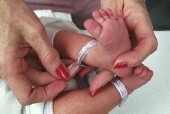
WEDNESDAY, Feb. 15 (HealthDay News) — Infants with birth defects who are born on weekends or at night do just as well as those delivered on a weekday, a new study says.
Both groups of infants stayed at the hospital for the same amount of time, had the same rates of admission to the neonatal intensive care unit, and required antibiotics or breathing assistance the same number of times, said the researchers from the University of Rochester Medical Center in New York.
The findings suggest that pregnant women carrying babies with birth defects should deliver when their bodies are ready, regardless of the day or time, the researchers said.
They analyzed data from 220 infants with known, non-lethal birth defects who were born between 2000 and 2010.
A number of studies have examined the association between delivery time and outcomes for healthy infants, but there was no current research on infants with birth defects, according to the authors of the new study.
“When we know that a baby will need further testing or surgical repair during the newborn period due to an identified abnormality, we typically try to arrange the delivery on a weekday,” Dr. Eva Pressman, a professor and director of the high-risk pregnancy program at the medical center, said in a university news release.
“But the bottom line is that the timing of delivery isn’t terribly important; if a woman goes into labor in the middle of the night or over the weekend her baby will do just as well,” she added.
The findings suggest there is no reason to induce labor or perform a cesarean section solely to deliver an infant with a birth defect during the day, said senior study author Dr. Loralei Thornburg, an assistant professor of maternal-fetal medicine.
“If there is no medical reason for inducing labor it is best to let the baby come on its own time, because we know elective induction is associated with negative outcomes for mom, including increased rates of cesarean delivery, greater blood loss and an extended length of stay in the hospital, and is without significant benefits for the baby,” she said in the news release.
The study was scheduled for presentation Friday at the annual meeting of the Society for Maternal-Fetal Medicine in Dallas.
Research and conclusions presented at medical meetings should be considered preliminary until published in a peer-reviewed medical journal.
More information
The U.S. Centers for Disease Control and Prevention has more about birth defects.

